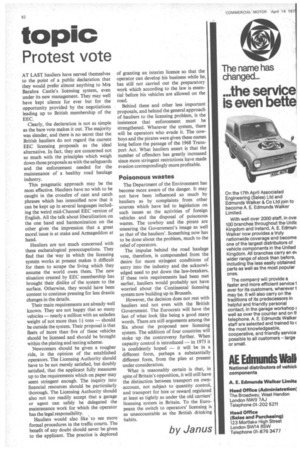topic
Page 64

If you've noticed an error in this article please click here to report it so we can fix it.
Protest vote
AT LAST hauliers have nerved themselves to the point of a public declaration that they would prefer almost anything to Mrs Barabra Castle's licensing system, even under its new management. They may well have kept silence for ever but for the opportunity provided by the negotiations leading up to British membership of the EEC.
Clearly, the declaration is not as simple as the bare vote makes it out. The majority was slender, and there is no secret that the British hauliers do not regard the current EEC licensing proposals as the ideal alternative. In fact, they are concerned not so much with the principles which weigh down those proposals as with the safeguards and the enforcement needed for the maintenance of a healthy road haulage industry.
This pragmatic approach may be the most effective. Hauliers have no wish to be caught in the crossfire of cant and catch phrases which has intensified now that it can be kept up in several languages including the weird mid-Channel EEC version of English. All the talk about liberalization on the one hand and harmonization on the other gives the impression that a great moral issue is at stake and Armageddon at hand.
Hauliers are not much concerned with these eschatalogical preoccupations. They find that the way in which the licensing system works at present makes it difficult for them to scrape the living which they assume the world owes them. The new situation created by EEC membership has brought their dislike of the system to the surface. Otherwise, they would have been content to continue pressing for less drastic changes in the details.
Their main requirements are already well known. They are not happy that so many vehicles — nearly a million with an unladen weight of not more than 1+ tons — should be outside the system. Their proposal is that fleets of fnore than• five of these vehicles should be licensed and should be brought within the plating and testing scheme.
Newcomers should be given a rougher ride, in the opinion of the established operators. The Licensing Authority should have to be not merely satisfied, but doubly satisfied, that the applicant fully measures up to the requirements which on paper may seem stringent enough. The inquiry into financial resources should be particularly thorough. The Licensing Authority should also not too readily accept that a garage or agent can safely be delegated the maintenance work for which the operator has the legal responsibility.
Hauliers would also like to see more formal procedures in the traffic courts. The benefit of any doubt should never be given to the applicant. The practice is deplored of granting an interim licence so that the operator can develop his business while he, has still not carried out the preparatory work which according to the law is essential before his vehicles are allowed on the road.
Behind these and other less important proposals, and behind the general approach of hauliers to the licensing problem, is the insistence that enforcement must be strengthened. Whatever the system, there will be operators who evade it. The cowboys and the pirates were given these names long before the passage of the 1968 Transport Act. What hauliers assert is that the number of offenders has greatly increased since more stringent restrictions have made evasion correspondingly more profitable.
Poisonous wastes
The Department of the Environment has become more aware of the danger. It may not have been influenced so much by hauliers as by complaints from other sources which have led to legislation on such issues as the activities of foreign vehicles and the disposal of poisonous wastes. The cowboy and the pirate are smearing the Government's image as well as that of the hauliers'. Something now has to be done about the problem, much to the relief of operators.
The impulse behind the road haulage vote, therefore, is compounded from the desire for more stringent conditions of entry into the industry and the acknowledged need to put down the law-breakers. If these twin requirements had been met earlier, hauliers would probably not have worried about the Continental licensing system now building up in Brussels.
However, the decision does not rest with hauliers and not even with the British Government. The Eurocrats will have the last of what look like being a good many words. There are still arguments among the Six about the proposed new licensing system. The addition of four countries will stoke up the controversy further. When capacity control is introduced — in 1973 it is confidently hoped — it will be in a different form, perhaps a substantially different form, from the plan at present under consideration.
What is reasonably certain is that, in spite of Britain's opposition, it will still have the distinction between transport on ownaccount, not subject to quantity control, and transport for hire or reward regulated at least as tightly as under the old carriers' licensing system in Britain. To the Europeans the switch to operators' licensing is as unaccountable as the British drinking habits.
by Janus




















































































































































